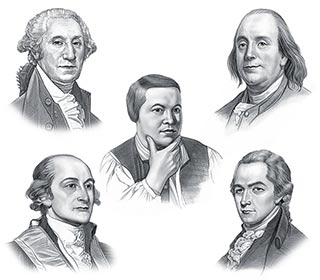Common law did not make mutiny a crime as it governed civilians not the military and consequently no legal action could be taken to stop mutineers.
British Laws and Taxation in the Colonies - 1699 Wool Act
The 1699 Wool Act was and important element in the policy of Mercantilism that favored England by which materials from the colonies such as Wool were used to make different woollen products in England as finished goods had a higher value than the raw materials.
British Laws and Taxation in the Colonies - Sugar Act and the Stamp Act
The enactment of the Sugar Act and the Stamp Act were both British Laws that were implemented to raise revenue for the British. The Sugar Act was designed to regulate trade, especially in the New England region and the Stamp Act was the first direct tax on home produced and consumed items.
British Laws and Taxation in the Colonies - 1765 Stamp Act
The 1765 Stamp Act was enacted to raise revenue from the American Colonies by a tax in the form of a stamp required on all newspapers, legal and commercial documents. The Stamp Act was first direct tax to be levied on the 13 colonies and affected the lives of every colonist.
British Laws and Taxation in the Colonies - 1732 Debt Recovery Act
The 1732 Debt Recovery Act was described as “a 'sweeping' statute that guaranteed uniform imperial treatment of slave property for debt-recovery purposes in England and its colonies, overriding all contrary colonial laws.”
British Laws and Taxation in the Colonies - 1689 English Bill of Rights
The 1689 English Bill of Rights confirming the rights of Parliament and the people and defining the limitations of the Crown
British Laws and Taxation in the Colonies - 1773 Tea Act
The 1773 Tea Act was enacted to bail out the British East India Company and expand the company's monopoly on the tea trade to all British Colonies to enable them to sell excess tea at a reduced price.
British Laws and Taxation in the Colonies - 1732 Hat Act
The 1732 Hat Act was enacted to control the production of hats in the 13 Colonies. The British wanted to restrict the manufacture and export of hats in the colonies, restrict the number of workers that could be hired, limit the number of apprentices and forbid the use of slaves in the trade.
British Laws and Taxation in the Colonies - 1750 Iron Act
The 1750 Iron Act was enacted to encourage the American manufacture of more pig iron and iron bars by the American colonists in the 13 Colonies to be sent to England, tax free. But the Act of 1750 also prohibited the colonies from producing finished iron goods.
British Laws and Taxation in the Colonies - Proclamation of 1763
The Proclamation of 1763 was enacted after the British victory over France during the French and Indian Wars. The Royal Proclamation was seen by the colonists as being beneficial to the Native American Indians and Great Britain but as detrimental to 13 colonies.
British Laws and Taxation in the Colonies - 1764 Currency Act
The 1764 Currency Act was a law that was enacted to regulated paper money and control the currency system in the 13 colonies.
British Laws and Taxation in the Colonies - 1765 & 1774 Quartering Act
The 1765 & 1774 Quartering Act were laws that were enacted to force local governments in the 13 colonies to provide provisions and housing to British soldiers who were stationed in America.
British Laws and Taxation in the Colonies - 1764 Sugar Act
The 1764 Sugar Act was a law enacted to tax sugar and molasses imported into the colonies which especially impacted the manufacture of rum in New England.
British Laws and Taxation in the Colonies - 1766 Declaratory Act
The 1766 Declaratory Act was a law that was enacted to assert the British Parliament's authority to pass laws that were binding on the 13 colonies.
British Laws and Taxation in the Colonies - 1767 Townshend Acts
The 1767 Townshend Acts were a collection of laws that set new import taxes on British goods and the money raised from the taxes was used to maintain British troops in America and to pay the salaries of some officials who were appointed to work in the 13 colonies.
British Laws and Taxation in the Colonies - 1774 Coercive (Intolerable) Acts
The 1774 Coercive Intolerable Acts were 5 separate laws that were enacted to punish the Massachusetts colonists for the actions taken in the Boston Tea Party.
